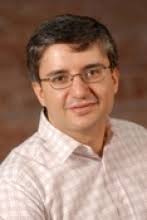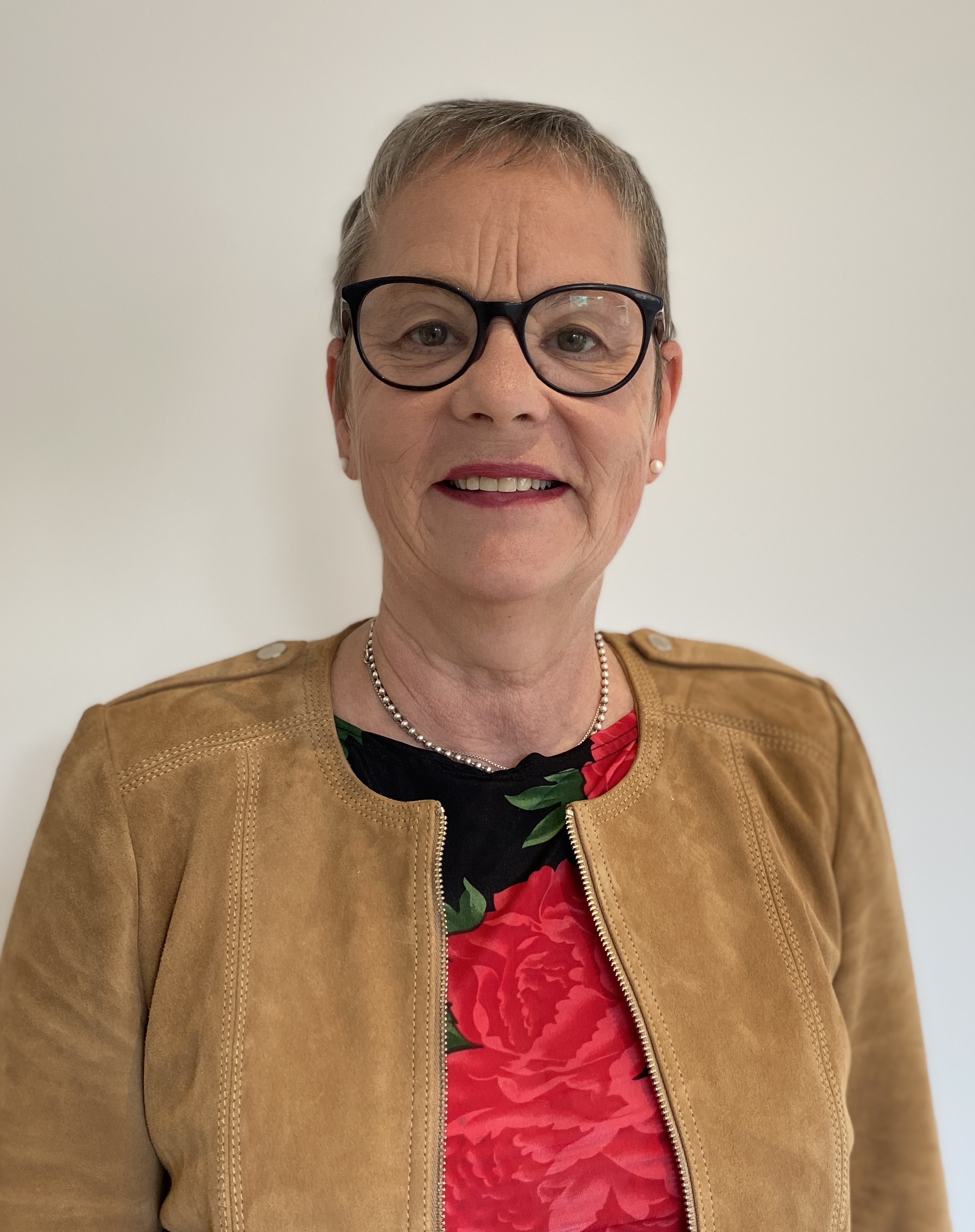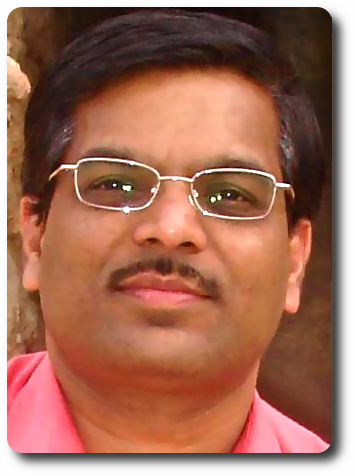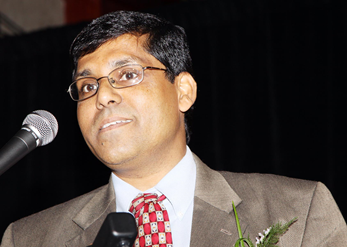Speakers
Speaker: Dr. Mohamed-Slim Alouini, King Abdullah University of Science and Technology (KAUST)

Biography: Mohamed-Slim Alouini was born in Tunis, Tunisia. He received the Ph.D. degree in Electrical Engineering from the Califonia Institute of Technology (Caltech) in 1998. He served as a faculty member at the University of Minnesota then in the Texas A&M University at Qatar before joining in 2009 the King Abdullah University of Science and Technology (KAUST) where he is now a Distinguished Professor of Electrical and Computer Engineering. Prof. Alouini is a Fellow of the IEEE and of Optica (formerly OSA). He is currently particularly interested in addressing the technical challenges associated with the uneven distribution, access to, and use of information and communication technologies in far-flung, rural, low-density populations, low-income, and/or hard-to-reach areas.
Abstract: A rapid increase in the use of wireless services over the last few decades has led to the problem of radio-frequency (RF) spectrum exhaustion. More specifically, due to this RF spectrum scarcity, additional RF bandwidth allocation, as utilized in the recent past over "traditional bands", is not anymore enough to fulfill the demand for more wireless applications and higher data rates. The talk goes first over the potential offered by extreme band communication (XB-Com) systems to relieve spectrum scarcity. Indeed, mm-wave, THz, and free space optics broadband wireless systems recently attracted several research interests worldwide due to the progress in electronics and photonics technologies. By utilizing these extreme frequency bands and employing extreme large bandwidths, the 6G target data rates over 100 Gbps could be achieved. The talk then summarizes some of the challenges that need to be surpassed before such kinds of systems can be deployed. For instance, it explains how the THz transmission band has immunity against the fog compared with the optical one, while being affected by the rain as it is the case for the mm-wave band. Finally, the talk offers an overview of some recent studies illustrating how these different XB-Com technologies can collaborate to increase emerging and future networks' reliability and coverage while maintaining their high capacity.
Biography: Prof. Erol Gelenbe, Fellow IEEE, ACM, IFIP, the Royal Statistical Society, and IET, was born in Istanbul, graduated from TED Ankara Koleji, and received the BS from METU (Ankara), the MS and PhD from Polytechnic Institute of NYU, and the DSc from the Sorbonne, Paris. He was awarded the ACM-SIGMETRICS Life-Time Achievement Award (2008) “as the single individual who, over a span of 30 years, has made the greatest overall contribution to the field of Computer System and Network Performance Evaluation through original research, mentoring and doctoral training, creation and direction of world class research groups, wide ranging international collaboration, and professional service." Renowned for pioneering mathematical models of computer systems and networks, inventing G-Networks and Random Neural Networks, he graduated over 90 PhDs, including 24 women. Currently Professor at the Institute of Theoretical and Applied Informatics, Polish Academy of Sciences, he was previously Chaired Professor at Imperial College, University of Central Florida, Duke University, Université Paris-Descartes and Paris-Orsay, and Université de Liège (Belgium). He impacted industry with developments such as the Queueing Network Analysis Package (Simulog), the XANTOS fiber-optics local area network, the SYCOMORE distributed voice-packet switch (Thales), the manufacturing simulator FLEXSIM, the C2 Agents (BAE Systems Ltd) software, the Cognitive Packet Network, and received “honoris causa” doctorates from Università di Roma II, Bogazici University (Istanbul), and Université de Liège (Belgium). Awards include the Parlar Foundation Science Award (2004), Grand Prix France Télécom (French Acad. of Sciences), IET Oliver Lodge Medal UK, and “In Memoriam Dennis Gabor Award” (Novofer Foundation, Budapest). Elected Fellow of Academia Europaea, the French National Acad. of Technologies, the Royal Acad. of Belgium, the Science Academies of Hungary, Poland and Turkey, and Honorary Fellow of the Islamic Academy of Sciences. He received the honors of Chevalier de la Légion d’Honneur, Chevalier des Palmes Académiques, Commandeur du Mérite of France, Commendatore al Merito and Grande Ufficiale dell’Ordine della Stella of Italy. Associate Editor of IEEE Transactions Cloud Computing, Acta Informatica, Performance Evaluation, he served as Editor-in-Chief of the Computer Journal and SN Computer Science. His consultancies have included INRIA, France-Telecom, Bull, IBM, Thomson CSF, Bell Labs, BT, General Dynamics UK, Huawei. Principal Investigator of many EU research projects, Coordinator of FP7 NEMESYS and H2020 SerIoT, he won numerous grants from NSF, ONR and ARO USA, EPSRC UK and industry. He is listed among the 26 most influential scientists and 500 most influential people of the Muslim world.

Biography: Maryline Chetto is currently a full professor in computer engineering with Nantes Université, France and researcher with CNRS. She received the degree of Docteur de 3ème cycle in control engineering and the degree of Habilitée à Diriger des Recherches in Computer Science from the University of Nantes, France, in 1984 and 1993, respectively. From 1984 to 1985, she held the position of Assistant professor of Computer Science at the University of Rennes, while her research was with the Institut de Recherche en Informatique et Systèmes Aléatoires (IRISA), Rennes. In 1986, she returned to Nantes and has been from 2002 a full professor with the University of Nantes. She is conducting her research at Laboratoire des Sciences du Numérique de Nantes (LS2N, UMR CNRS n° 6004) in the Real Time System group.
Her research has been focused on development and formal validation of solutions regarding Scheduling, Fault-tolerance and Dynamic Power Management in real time embedded applications. Her current research is specifically targeting real-time scheduling issues in energy neutral sensors. She has more than 150 papers published in international journals and conferences. She was the editor of the books Real-time Systems Scheduling (Elsevier, 2014) with volume 1 Fundamentals and Volume 2 Focusses. She was the co-author of the book Energy Autonomy of real-time systems (Elsevier, 2016). She was general chair of the 2020 IEEE International Conference on Green Computing and Communications (GreenCom-2020). Since 2011, she was elected member of the French National Council for Universities.
Abstract: With the rapid development of the Internet of Things, energy autonomous systems have been in the focus of researchers in recent years. Such systems, mainly including wireless sensors, should be designed to function perpetually without any human intervention because either costly or impractical. Energy harvesting has emerged as a feasible option to supply wireless sensors and to permit them energy neutral operation. Nonetheless, the energy environmental source is fluctuating and not controllable. Hence, specific power management and scheduling solutions have to be conceived so as to prevent energy starvation and guarantee real-time responsiveness. Task scheduling in the sensor node should take into account not only the timing parameters of the deadline constrained tasks but also the characteristics of the energy source and the capacity of the energy storage unit. Neither the classical greedy scheduler Earliest Deadline First (EDF) nor Rate Monotonic (RM) are suitable for this novel operational context. This keynote addresses state of the art as well as our findings in real-time scheduling and dynamic processor management for energy harvesting small electronic devices with real-time requirements.
The Internet of Things (IoT) paradigm enables seamless integration of cyber-and-physical worlds and opening opportunities for creating new class of applications for domains such as smart cities, smart robotics, and smart healthcare. The emerging Fog/Edge computing paradigms support latency sensitive/real-time IoT applications with a seamless integration of network-wide resources all the way from edge to the Cloud.
This keynote presentation will cover (a) 21st century vision of computing and identifies various IT paradigms promising to deliver the vision of computing utilities; (b) innovative architecture for creating elastic Clouds integrating edge resources and managed Clouds, (c) Aneka 5G, a Cloud Application Platform, for rapid development of Cloud/Big Data applications and their deployment on private/public Clouds with resource provisioning driven by SLAs, (d) a novel FogBus software framework with Blockchain-based data-integrity management for facilitating end-to-end IoT-Fog/Edge-Cloud integration for execution of sensitive IoT applications, (e) experimental results on deploying Cloud and Big Data/ IoT applications in engineering, and health care (e.g., COVID-19), deep learning/Artificial intelligence (AI), satellite image processing, and natural language processing (mining COVID-19 research literature for new insights) on elastic Clouds, (f) QFaaS: A Serverless Function-as-a-Service Framework for Quantum Computing, and (g) directions for delivering our 21st century vision along with pathways for future research in Cloud and Edge/Fog computing.
Software technologies for Grid, Cloud, and Fog computing developed under Dr. Buyya's leadership have gained rapid acceptance and are in use at several academic institutions and commercial enterprises in 50+ countries around the world. Manjrasoft's Aneka Cloud technology developed under his leadership has received "Frost New Product Innovation Award". He served as founding Editor-in-Chief of the IEEE Transactions on Cloud Computing. He is currently serving as Editor-in-Chief of Software: Practice and Experience, a long-standing journal in the field established 50+ years ago. For further information on Dr. Buyya, please visit his cyberhome: www.buyya.com
Biography: Sajal K. Das is a professor of Computer Science and the Daniel St. Clair Endowed Chair at the Missouri University of Science and Technology, USA where he was the Chair of Computer Science Department during 2013-2017. He served the NSF as a Program Director in the Computer Networks and Systems division during 2008-2011. Prior to 2013, he was a University Distinguished Scholar Professor of Computer Science and Engineering and founding director of the Center for Research in Wireless Mobility and Networking (CReWMaN) at the University of Texas at Arlington. He has mentored 11 postdocs, 48 Ph.D. students, 31 M.S. theses, and numerous undergraduate research students.
Dr. Das’ research interests include wireless and sensor networks, mobile and pervasive computing, UAVs, mobile crowdsensing, cyber-physical systems and IoT, smart environments (e.g., smart city, smart grid, smart transportation, smart agriculture, and smart health), distributed and cloud computing, cyber security, biological and social networks, and applied graph theory and game theory. He has made fundamental contributions to these areas and published extensively with 350+ research articles in high quality journals and 475+ papers in refereed conference proceedings. He holds 5 US patents and coauthored 4 books – Smart Environments: Technology, Protocols, and Applications (John Wiley, 2005), Handbook on Securing Cyber-Physical Critical Infrastructure: Foundations and Challenges (Morgan Kauffman, 2012), Mobile Agents in Distributed Computing and Networking (Wiley, 2012), and Principles of Cyber-Physical Systems: An Interdisciplinary Approach (Cambridge University Press, 2020). His h-index is 95 with more than 36,500+ citations according to Google Scholar.
Dr. Das is a recipient of 12 Best Paper Awards at prestigious conferences, such as ACM MobiCom and IEEE PerCom, and numerous awards for teaching, mentoring and research including the IEEE Computer Society’s Technical Achievement Award for pioneering contributions to sensor networks, and University of Missouri System President’s Award for Sustained Career Excellence. He serves as the founding Editor-in-Chief of Elsevier’s Pervasive and Mobile Computing Journal, and as Associate Editor of the IEEE Transactions on Dependable and Secure Computing, IEEE Transactions on Mobile Computing, Journal of Parallel and Distributed Computing, and ACM Transactions on Sensor Networks. Dr. Das is a Distinguished Alumni of the Indian Institute of Science, Bangalore. He is an IEEE Fellow.
Vijay has been on several industry Boards such as the Trustworthy Computing Academic Advisory Board (Microsoft, USA), SAP International Security Advisory Board (SAP Corporation, Germany/USA) as well as at Hewlett-Packard. He has also been on several Government Advisory Committees such as the Australian Government's Peak Security Advisory Body, ITSEAG, for the Ministry of Broadband, Communications and Digital Economy, Australia, Prime Ministerial Cyber Security Task Force (CSTF), Strategic Research Priorities Committee, Office of the Chief Scientist of Australia, Australian Research Council (ARC) College of Experts and a member of the Australian Academy of Science National Committee on Information and Communication Systems.
Vijay has had several visiting professorial positions at different institutions over the years including Cambridge University, Microsoft Research Cambridge, National University of Singapore, French National Research Labs (INRIA), Indian Inst. of Technology, Fujitsu Research Labs, Edinburgh University, Adjunct at Oxford University and the Chinese Academy of Sciences. Vijay has also been a Senior Visiting Fellow with the Australian Academy of Science and the Indian Institute of Science. Vijay has also been Mercator Fellow by the German Research Foundation with the Technical University of Darmstadt.
Vijay has published more than 480 peer reviewed papers in International Journals and Conferences and has been on the Editorial Boards of several journals including ACM Transactions on Information System Security, IEEE Transactions on Dependable and Secure Systems, IEEE Transactions in Information Forensics and Security IEEE Transactions in Cloud Computing and International Journal of Information Security, Springer.
Vijay is a Fellow of the British Computer Society (FBCS), a Fellow of the IEE, UK (FIEE), a Fellow of the Institute of Mathematics and Applications, UK (FIMA), a Fellow of the Australian Institute of Engineers (FIEAust), a Fellow of the Australian Computer Society (FACS), a Fellow of the Institution of Electronic and Telecommunication Engineers (FIETE) and a Fellow of the Royal Chartered Institute Information Security, UK (FCIIS).
Vijay attained his Ph.D in Computer and Communication Security from Plymouth and Exeter Universities in the UK in 1984, sponsored by British Telecom Research Labs. He obtained his Electronic Engineering First Class Hons degree from Sussex University, UK in 1981. https://www.newcastle.edu.au/profile/vijay-varadharajan#career
.




